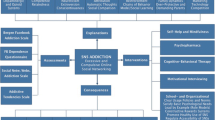Abstract
Problem gambling screeners are easily accessible and potentially reduce harm for those individuals who engage in risky levels of gambling behavior. However, a recent study found that when frequent gamblers were offered the chance to complete a screener and receive feedback, most chose not to do so. In this paper, secondary analysis was completed on frequent gamblers’ open-ended responses to questions regarding reasons for and against completing a problem gambling screener. Participants (N = 262) were individuals who gambled at least once per week and were not currently being treated for gambling problems. A qualitative open-coding procedure independently completed by multiple researchers revealed that the most common reasons for completing the screener were individuals having a desire to check in on their behavior, because they were curious about the screener, because they were experiencing gambling-related harm, or that they were already considering making changes to their gambling. The most common reasons against completing the screener were that they were either avoidant of the experience because they thought it might cause psychological distress, or because they believed that they did not have a problem. This study provides insight into why many individuals who engage in risky levels of gambling behavior do not seek out helping resources. In addition to creating practically accessible helping resources, researchers should focus on techniques that can make help-seeking a less distressing and more acceptable experience.
Similar content being viewed by others
Data Availability
Data has not been stored in a publicly accessible repository but can be made available for via direct requests to the corresponding author.
References
Alcoholics Anonymous. (2001). Alcoholics Anonymous (4th ed.). New York: Alcoholics Anonymous World Services Inc.
Chawla, N., & Ostafin, B. (2007). Experiential avoidance as a functional dimensional approach to psychopathology: An empirical review. Journal of Clinical Psychology, 63(9), 871–890.
Currie, S. R., Hodgins, D. C., Casey, D. M., el-Guebaly, N., Smith, G. J., Williams, R. J., et al. (2012). Examining the predictive validity of low-risk gambling limits with longitudinal data. Addiction, 107(2), 400–406.
Gebauer, L., LaBrie, R., & Shaffer, H. J. (2010). Optimizing DSM-IV-TR classification accuracy: A brief biosocial screen for detecting current gambling disorders among gamblers in the general household population. The Canadian Journal of Psychiatry, 55(2), 82–90.
Hardoon, K., Derevensky, J. L., & Gupta, R. (2003). Empirical measures vs. perceived gambling severity among youth: Why adolescent problem gamblers fail to seek treatment. Addictive Behaviors, 28(5), 933–946.
Hayes, S. C., Wilson, K. G., Gifford, E. V., Follette, V. M., & Strosahl, K. (1996). Experiential avoidance and behavioral disorders: A functional dimensional approach to diagnosis and treatment. Journal of Consulting and Clinical Psychology, 64(6), 1152.
Hing, N., Nuske, E., & Gainsbury, S. (2012). Gamblers at-risk and their help-seeking behaviour. Melbourne: Gambling Research Australia.
Padgett, D. K. (2011). Qualitative and mixed methods in public health. Thousand Oaks: Sage Publications.
Peter, S. C., Whelan, J. P., Pfund, R. A., & Meyers, A. W. (2020). Can motivational messages engage individuals at-risk for gambling disorder in an online assessment? Psychology of Addictive Behaviors. https://doi.org/10.1037/adb0000591.
Petry, N. M., Ginley, M. K., & Rash, C. J. (2017). A systematic review of treatments for problem gambling. Psychology of Addictive Behaviors, 31(8), 951–961.
Prochaska, J. O., Velicer, W. F., Rossi, J. S., Goldstein, M. G., Marcus, B. H., Rakowski, W., et al. (1994). Stages of change and decisional balance for 12 problem behaviors. Health Psychology, 13(1), 39–46.
Pulford, J., Bellringer, M., Abbott, M., Clarke, D., Hodgins, D., & Williams, J. (2009). Barriers to help-seeking for a gambling problem: The experiences of gamblers who have sought specialist assistance and the perceptions of those who have not. Journal of Gambling Studies, 25(1), 33–48.
Slutske, W. S. (2006). Natural recovery and treatment-seeking in pathological gambling: Results of two US national surveys. American Journal of Psychiatry, 163(2), 297–302.
Suurvali, H., Hodgins, D., Toneatto, T., & Cunningham, J. (2008). Treatment seeking among Ontario problem gamblers: Results of a population survey. Psychiatric Services, 59(11), 1343–1346.
Funding
This study was supported by a dissertation grant from the International Center for Responsible Gaming, and by the Tennessee Department of Mental Health and Substance Abuse Services. The contents of this study contents are solely our own responsibility and do not necessarily represent the official views of the funding agencies.
Author information
Authors and Affiliations
Corresponding author
Ethics declarations
Conflict of interest
The authors declare that they have no conflict of interest.
Ethical Approval
All procedures performed in this study involving human participants were in accordance with the ethical standards of the institutional research committee and with the 1964 Helsinki declaration and its later amendments and comparable ethical standards.
Additional information
Publisher's Note
Springer Nature remains neutral with regard to jurisdictional claims in published maps and institutional affiliations.
Rights and permissions
About this article
Cite this article
Peter, S.C., Horn, T.L., McPhail, A. et al. Frequent Gamblers’ Reasons for and Against Completing a Problem Gambling Screener. J Gambl Stud 37, 1335–1346 (2021). https://doi.org/10.1007/s10899-021-10010-9
Accepted:
Published:
Issue Date:
DOI: https://doi.org/10.1007/s10899-021-10010-9




